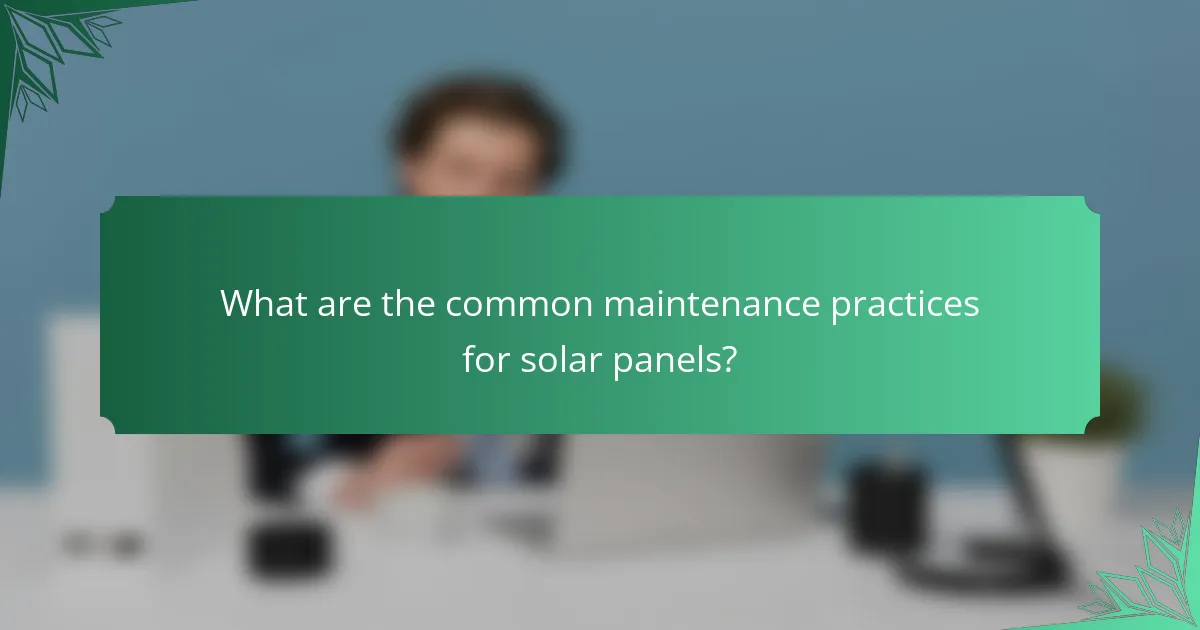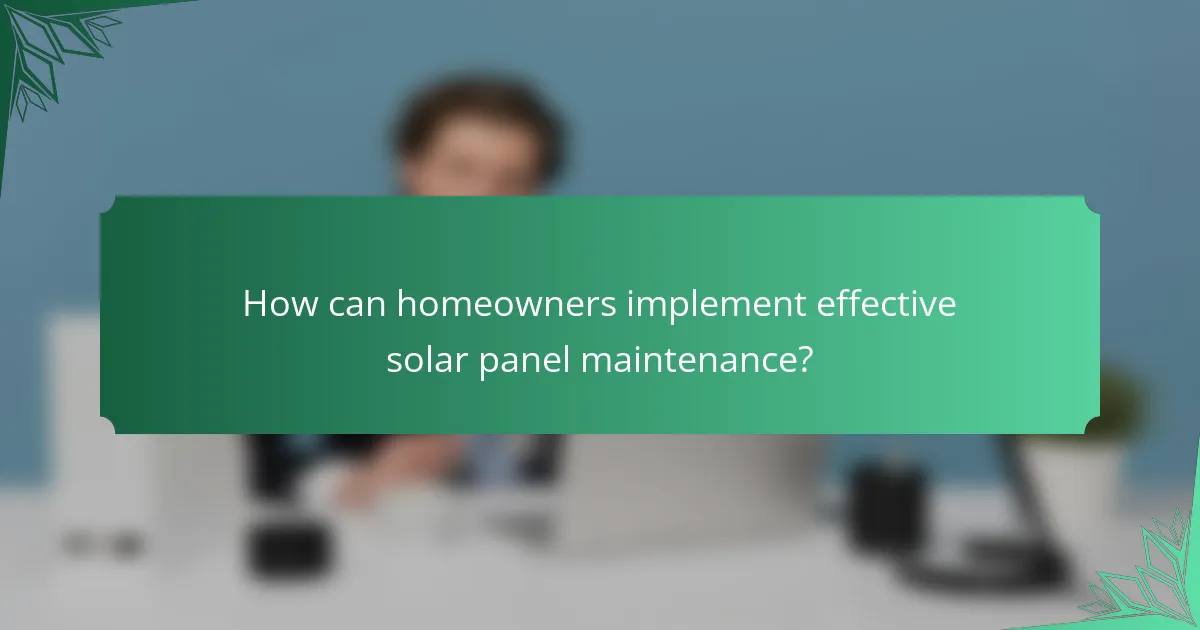
What are the Benefits of Regular Solar Panel Maintenance for Energy Savings?
Regular solar panel maintenance enhances energy savings by ensuring optimal performance and efficiency. Clean panels absorb more sunlight, leading to increased energy production. Regular inspections can identify issues like dirt buildup or shading that reduce output. A study by the National Renewable Energy Laboratory found that well-maintained systems can produce up to 25% more energy. Additionally, maintenance helps extend the lifespan of the panels, providing long-term savings. Preventative measures can also reduce costly repairs, further enhancing financial benefits. Overall, consistent upkeep maximizes energy savings from solar installations.
How does regular maintenance impact solar panel efficiency?
Regular maintenance significantly enhances solar panel efficiency. Cleaning solar panels removes dirt, dust, and debris that can block sunlight. This blockage reduces the amount of solar energy converted into electricity. Regular inspections identify and address any damage or wear. Early detection of issues like cracked panels or faulty wiring prevents further efficiency loss. Research shows that well-maintained solar panels can operate at 20-30% higher efficiency than neglected ones. Overall, consistent maintenance ensures optimal performance and maximizes energy savings.
What specific maintenance tasks contribute to improved efficiency?
Regular cleaning of solar panels contributes to improved efficiency. Dirt and debris can block sunlight, reducing energy production. Inspecting electrical connections ensures they are secure and functioning correctly. This prevents energy loss due to faulty wiring. Checking for shading from nearby objects helps maintain optimal sunlight exposure. Removing any obstructions can enhance performance. Monitoring inverter performance identifies issues early, ensuring consistent energy output. Regular maintenance tasks like these can increase energy efficiency by up to 20%, according to the National Renewable Energy Laboratory.
How often should solar panels be maintained for optimal performance?
Solar panels should be maintained at least once or twice a year for optimal performance. Regular maintenance ensures that dirt, debris, and potential damage are addressed. This frequency helps to maintain efficiency and prolong the lifespan of the solar panels. Studies indicate that well-maintained solar panels can perform up to 20% more efficiently. Regular checks can also identify any issues early, preventing costly repairs.
Why is maintaining solar panels important for long-term energy savings?
Maintaining solar panels is crucial for long-term energy savings because it ensures optimal performance and efficiency. Regular maintenance prevents dirt and debris from accumulating, which can block sunlight and reduce energy output. Clean panels can produce up to 25% more energy compared to dirty ones. Additionally, routine inspections identify potential issues early, such as wiring problems or inverter malfunctions. Addressing these issues promptly can prevent costly repairs and downtime. Studies show that well-maintained solar systems have longer lifespans, often exceeding 25 years. This longevity translates to sustained energy savings over time.
What are the financial implications of neglecting maintenance?
Neglecting maintenance of solar panels can lead to significant financial implications. Reduced efficiency occurs when dirt, debris, or damage accumulate on the panels. This inefficiency results in lower energy production and, consequently, decreased savings on electricity bills.
According to the U.S. Department of Energy, a well-maintained solar panel system can produce up to 20% more energy than one that is neglected. Over time, this loss in production can amount to thousands of dollars in missed savings.
Additionally, neglecting maintenance can lead to costly repairs. Small issues, if left unaddressed, can escalate into major problems requiring expensive fixes. For instance, inverter replacements can cost between $1,000 and $3,000, depending on the system size.
In summary, the financial implications of neglecting maintenance include reduced energy savings, potential repair costs, and overall lower return on investment for solar panel systems.
How does maintenance affect the lifespan of solar panels?
Regular maintenance significantly enhances the lifespan of solar panels. Cleaning the panels removes dirt and debris that can block sunlight. This ensures optimal energy production and efficiency. Inspections identify potential issues, such as loose wiring or corrosion. Addressing these problems early prevents more extensive damage. Studies indicate that well-maintained solar panels can last 25 years or more. In contrast, neglected panels may experience reduced efficiency and a shorter lifespan. Regular maintenance ultimately protects the investment in solar technology.

What are the common maintenance practices for solar panels?
Common maintenance practices for solar panels include regular cleaning, inspections, and monitoring. Cleaning removes dirt and debris that can block sunlight. Inspections help identify potential issues such as cracks or loose connections. Monitoring systems track energy production and can signal problems. These practices ensure optimal performance and longevity. Regular maintenance can increase energy efficiency by up to 20%. This data supports the importance of consistent upkeep for solar panels.
What routine checks should be performed on solar panels?
Routine checks on solar panels include visual inspections, cleaning, and performance monitoring. Visual inspections should focus on the panels for cracks, dirt, or debris. Cleaning is essential to remove dust and grime that can hinder performance. Performance monitoring involves checking the energy output against expected levels. Regular checks can identify issues early, ensuring optimal efficiency. Studies show that well-maintained solar panels can operate at up to 90% efficiency compared to unmaintained panels, which may drop to 70% or lower.
How can cleaning solar panels enhance their performance?
Cleaning solar panels enhances their performance by removing dirt, dust, and debris that obstruct sunlight. This obstruction can significantly reduce energy output. Research shows that unclean panels can lose up to 25% of their efficiency. Regular cleaning ensures maximum light absorption, leading to optimal energy production. Studies indicate that clean panels can generate 5-20% more energy compared to dirty ones. Thus, maintaining cleanliness directly correlates with improved performance and energy savings.
What role does monitoring play in maintenance?
Monitoring plays a crucial role in maintenance by ensuring optimal performance and early detection of issues. It allows for real-time assessment of solar panel efficiency and energy output. Regular monitoring can identify performance drops that may indicate dirt accumulation or equipment malfunction. According to a study by the National Renewable Energy Laboratory, systems with regular monitoring can increase energy production by up to 15%. Additionally, monitoring helps in scheduling timely maintenance, reducing downtime and repair costs. Thus, effective monitoring is essential for maximizing energy savings and maintaining solar panel functionality.
What tools and resources are needed for solar panel maintenance?
Basic tools for solar panel maintenance include a soft brush, hose, and microfiber cloth. These tools help in cleaning the panels effectively without causing damage. A voltage meter is essential for checking the system’s electrical output. Additionally, safety gear such as gloves and goggles is necessary for personal protection during maintenance tasks. A ladder may be required to access higher panels safely. Regular inspections also need a checklist to ensure all aspects of the system are evaluated. Resources like manufacturer manuals provide guidance on specific maintenance needs for different solar panel models.
What safety precautions should be taken during maintenance?
Safety precautions during solar panel maintenance include wearing personal protective equipment. This equipment should consist of gloves, helmets, and safety glasses. Additionally, ensure that the solar panels are de-energized before starting any work. Use insulated tools to prevent electrical shocks. Secure the work area to prevent unauthorized access. Follow ladder safety protocols when accessing roof-mounted panels. It is also essential to have a first aid kit readily available. These precautions help minimize risks associated with electrical hazards and falls.

How can homeowners implement effective solar panel maintenance?
Homeowners can implement effective solar panel maintenance by regularly cleaning the panels, inspecting for damage, and monitoring performance. Cleaning should be done at least twice a year to remove dirt and debris that can reduce efficiency. Inspections help identify cracks or loose connections that may affect energy output. Homeowners should also check the inverter and wiring for any signs of wear. Monitoring performance through solar monitoring systems can alert homeowners to any drops in energy production. Regular maintenance can enhance system longevity and optimize energy savings, as studies show well-maintained solar panels can produce up to 20% more energy.
What DIY maintenance tasks can homeowners perform?
Homeowners can perform several DIY maintenance tasks. They can regularly clean solar panels to enhance efficiency. This involves using a soft brush and mild soap to remove dirt. Homeowners can also inspect the solar panel system for any visible damage. Checking for loose connections is crucial for safety and efficiency. Additionally, homeowners can trim nearby trees that may cast shadows on panels. Monitoring the inverter’s performance can help identify issues early. They can also clear debris from the roof and gutters to prevent water damage. These tasks contribute to maintaining energy efficiency and prolonging the lifespan of the solar system.
How can homeowners identify when to call a professional?
Homeowners should call a professional when they notice any significant drop in solar panel efficiency. This can be indicated by a substantial decrease in energy production compared to previous months. Additionally, if homeowners see physical damage, such as cracks or discoloration on solar panels, it is time to seek professional help. Unusual noises from the inverter or electrical components also signal potential issues. If homeowners experience frequent system shutdowns or error messages, they should consult a professional. Regular inspections are recommended at least once a year to prevent larger issues. These practices ensure optimal performance and longevity of the solar system.
What are the best practices for scheduling maintenance?
The best practices for scheduling maintenance include creating a regular maintenance calendar. This calendar should outline specific dates for inspections and cleaning. It is essential to align maintenance with seasonal changes. For instance, scheduling before winter can prevent snow buildup. Additionally, consider the solar panel manufacturer’s recommendations. Many manufacturers suggest maintenance every six months. Tracking performance metrics can help identify when maintenance is needed. Regularly reviewing energy output ensures optimal function. Following these practices maximizes energy savings and extends the lifespan of solar panels.
How can maintenance records help in tracking performance?
Maintenance records help in tracking performance by providing a historical overview of solar panel upkeep. They document each maintenance activity, including inspections and repairs. This data allows for the identification of patterns in performance over time. For instance, records can reveal when efficiency declines after specific maintenance tasks. Analyzing these trends can inform future maintenance strategies. Furthermore, maintenance records can highlight recurring issues, guiding proactive measures. This proactive approach can enhance overall system performance. Consistent documentation supports compliance with warranty requirements. Ultimately, thorough records contribute to maximizing energy savings from solar panels.
What are the most common troubleshooting tips for solar panel issues?
Check for dirt or debris on the solar panels. Cleaning panels can improve efficiency significantly. Inspect the wiring for any visible damage or loose connections. Damaged wiring can lead to energy loss. Monitor the inverter to ensure it is functioning properly. An inverter failure can halt energy production. Review the shading from nearby trees or buildings. Shading can drastically reduce panel output. Check for error messages on the inverter display. These messages can indicate specific issues needing attention. Ensure that the panels are positioned correctly and not tilted improperly. Proper alignment is crucial for optimal sunlight exposure.
The main entity of this article is solar panel maintenance, which is essential for maximizing energy savings. Regular maintenance enhances the efficiency and performance of solar panels by ensuring they remain clean and free from obstructions, potentially increasing energy production by up to 25%. Key maintenance practices include routine cleaning, inspections for damage, and monitoring performance to prevent costly repairs and extend the lifespan of the system. The article also discusses the financial implications of neglecting maintenance and offers practical tips for homeowners to implement effective upkeep.